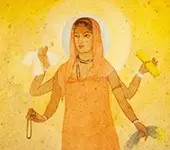The History of Alcohol
This audio tells you about- 1. Why Asuras invented alcohol. 3. Why alcohol is bad 4. How Asuras conspired to make Indra drink alcohol.


English
Bharat Matha
Click on any topic to open
- 42 Agnikula: The Fire Lineage of Rajputs
- 41 Longevity of Our Ancients
- 40 Brahmacharya Stage of Life in Ancient Bharat
- 39 Alwar City and Mahabharata
- 38 Zoroastrianism: An Offshoot of the Vedic Religion
- 37 Origin of the Terms, Hindu and Hindustan
- 36 Vedic and Zoroastrian Religions: A Role Reversal
- 35 Harappa was Hariyupiya: Rigveda Refutes Aryan Migration Theory
- 34 Descendants of Lord Rama and Yudhishthira: Royal Legacies in History
- 33 The Revolutionary Legacy of Abhinav Bharat: A Comprehensive Look
- 32 Geography in Mahabharata
- 31 Seven Ancient Kingdoms to the West of Sindhu
- 30 Guru Ram Singh - A Hero Of Indian Freedom Movement
- 29 Bharata Varsha = Indian Peninsula + Eight Islands. Which Are They?
- 28 The Puranic Geography Of Bharata Varsha
- 27 Many Rishis Consider Indra and Varuna as Equals
- 26 Devasura Battle At Balkh
- 25 Vrishakapi the Asura Chief
- 24 The History of Alcohol
- 23 Founding of the Asura Religion
- 22 Bharata Varsha Gets Divided Into Two Parts
- 21 How Siberia Lost Its Status as Swarga on Earth
- 20 How Did Bharata Varsha Get Its Name?
- 19 We Should Build Temples for Bharat Mata and Worship Her
- 18 There Is Brahmaloka and Vishnuloka on the Surface of Earth Also
- 17 There Is Agniloka, Vayuloka, and Indraloka on the Surface of Earth Also
- 16 What Is the Role of Religion in a Secular Nation?
- 15 Lesser Known Facts About Jhansi Rani - Part 3
- 14 Lesser Known Facts About Jhansi Rani - Part 2
- 13 Lesser Known Facts About Jhansi Rani - Part 1
- 12 The Childhood of Sardar Patel
- 11 What Exactly is Jamboo Dwipa?
- 10 Actions in Bharata Varsha Alone Earn Punya and Papa
- 9 How Pilgrimages Held Bharata Together as a Single Nation
- 8 Rigveda on Seven Punya Nadis of Hindustan
- 7 How Rivers Helped in Keeping India as a Single Unit
- 6 Natural Abundance Shaped India's Thought Process
- 5 Importance of Prayag
- 4 Revisiting Education through the Lens of Sanatana Dharma
- 3 God Is Love, Said Tamil Saint Thirumular
- 2 Why All Avataras Happened in India Only?
- 1 Our Culture Is Strong Because It Is Based On Eternal Truth
7
30
Astrology
Atharva Sheersha
Bhagavad Gita
Bhagavatam
Bharat Matha
Devi
Devi Mahatmyam
Ganapathy
Glory of Venkatesha
Hanuman
Kathopanishad
Mahabharatam
Mantra Shastra
Mystique
Practical Wisdom
Purana Stories
Radhe Radhe
Ramayana
Rare Topics
Rituals
Rudram Explained
Sages and Saints
Shiva
Spiritual books
Sri Suktam
Story of Sri Yantra
Temples
Vedas
Vishnu Sahasranama
Yoga Vasishta
26
17
Copyright © 2025 | Vedadhara | All Rights Reserved. | Designed & Developed by Claps and Whistles